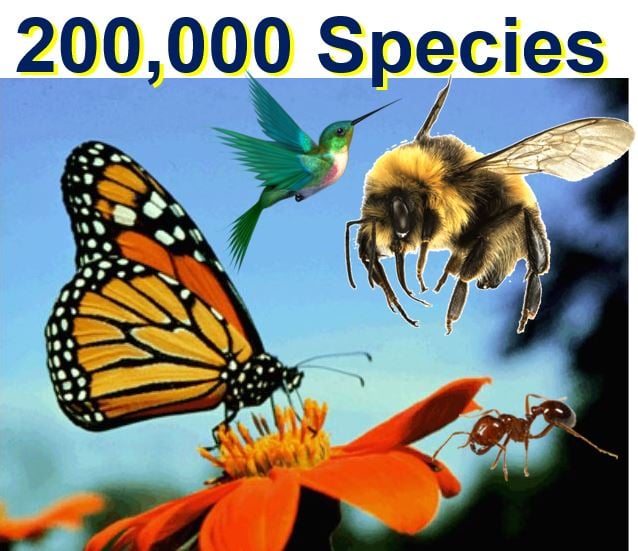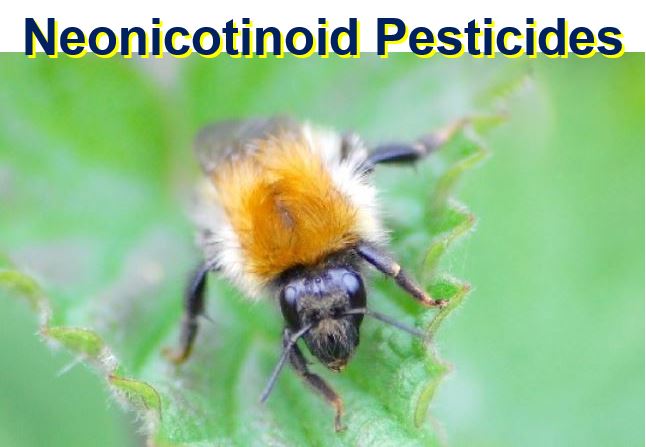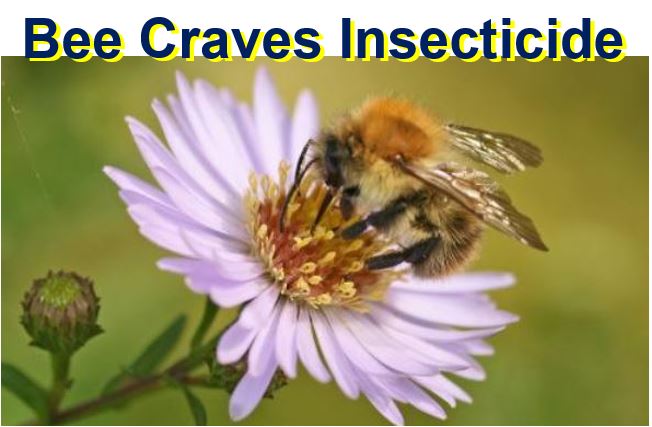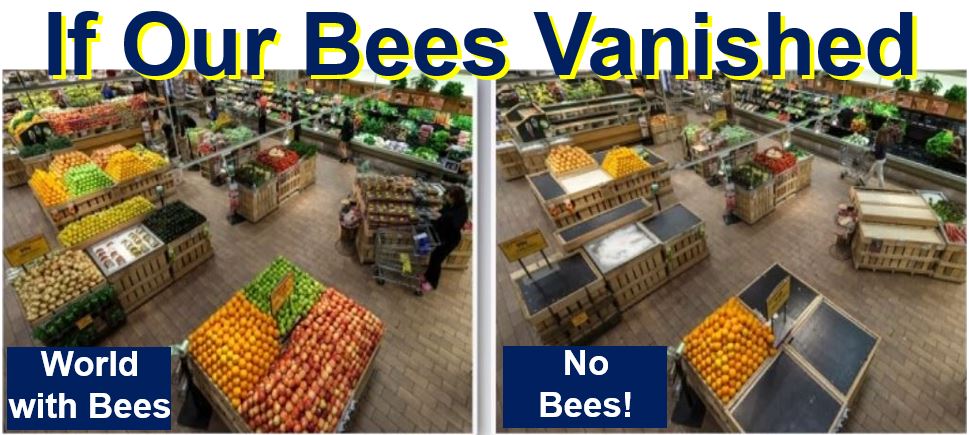The global food supply, which relies heavily on pollinating animals such as bees, butterflies, birds and beetles, is under threat because populations of these essential creatures are declining alarmingly, say scientists . In fact, many of them are facing a real threat of possible extinction.
Modern agricultural practices are partly to blame for the steep declines in key population species across North America and Europe. In Europe, populations of at least 31% of butterfly and 37% of bee species are declining.
The status of pollinator populations in other parts of the world, such as Asia, Africa and Latin America are less clear, because of a lack of data, say scientists.
 If we do not help boost the populations of the world’s pollinating animals, our food production will suffer. (Image: moomah.com)
If we do not help boost the populations of the world’s pollinating animals, our food production will suffer. (Image: moomah.com)
A new report from Governments and experts from across the world addresses the threats to animal pollinators such as bats, birds and bees, that are essential for over three-quarters of global food crops, and intimately associated with human nutrition, culture and millions of livelihoods.
Simple strategies to harness pollinator power
According to researchers at the University of Cambridge and other centres across the world, simple strategies could boost agricultural yield by harnessing pollinator power.
Delegates from nearly 100 national Governments have come together in Kuala Lumpur, Malaysia, to discuss how to combat the threats animal pollinators face – specifically bats, beetles, wasps, moths, butterflies, birds, flies and bees that carry pollen essential to the reproduction for most of our global crops as well as plant life.
This is the first time the global community has got together on this scale to discuss the preservation of the little animals that help fertilize over 75% of the leading kinds of global food crops and almost 90% of flowering wild plant species.
 According to the North American Pollinator Protection Campaign: “Over 200,000 species of animals act as pollinators. The vast majority of animal pollinators are insects such as beetles, bees, ants, wasps, butterflies and moths; of these, bees pollinate the largest number of plant species. About 1,000 species of pollinators are hummingbirds, bats, and other small mammals.”
According to the North American Pollinator Protection Campaign: “Over 200,000 species of animals act as pollinators. The vast majority of animal pollinators are insects such as beetles, bees, ants, wasps, butterflies and moths; of these, bees pollinate the largest number of plant species. About 1,000 species of pollinators are hummingbirds, bats, and other small mammals.”
A report on pollinator species, which covered a period of two years and involved more than 77 scientists from across the world, including Dr. Lynn Dicks from the University of Cambridge, has been adopted by IPBES (the Intergovernmental Science-Policy Platform on Biodiversity and Ecosystem Services). A total of 125 member Governments have signed up to IPBES.
First assessment ever issued by IPBES
The report is the first assessment IPBES has ever issued, and the first time that such an assessment has managed to bring together multiple knowledge systems comprehensively, including scientific, local and indigenous knowledge.
It will highlight the threats to the little creatures that pollinate plants, and the major implications of the declines in these species’ populations for the global food supply and economy.
The report also explains how pollinator power can be used to help biodiversity, food security and humans – by harnessing natural relationships between animals and plants to improve agricultural production and strengthen local communities.
Dr. Lynn Dicks, NERC (Natural Environment Research Council) Research Fellow at the University of Cambridge’s Department of Zoology, said:
“It is incredible to see international Governments coming together to discuss the problem of pollinators in this way. Without pollinators, many of us would not be able to enjoy chocolate, coffee and vanilla ice cream, or healthy foods like blueberries and Brazil nuts.”
“The value of pollinators goes way beyond this. People’s livelihoods and culture are intimately linked with pollinators around the world. All the major world religions have sacred passages that mention bees.”
 A team of scientists found that low-level neonicotinoid pesticides harm bumblebee pollination of apple trees. This affects farmers’ crop yields significantly, as well as the quality of their fruit. (Image: bumblebeeconservation.org. Credit: Richard Comont)
A team of scientists found that low-level neonicotinoid pesticides harm bumblebee pollination of apple trees. This affects farmers’ crop yields significantly, as well as the quality of their fruit. (Image: bumblebeeconservation.org. Credit: Richard Comont)
We need pollinators for our food supply
Over the past fifty years, the volume of pollinator-dependent food produced globally has increased by 300%, including most fruits, as well as nuts, cocoa and coffee. Put simply, we have become incredibly dependent on pollinator animals for our food.
Approximately thirty-five percent of all farmland worldwide is occupied by such crops. While these crops depend on animal pollination to varying degrees – along with other pollinators, such as wind – the scientists estimate that from 5% to 8% of all worldwide crop production is directly attributable to animal pollinators, with a market value of $577 billion each year.
However, researchers warn that several different types of agricultural practices are contributing the devastating declines in key pollination species across North America and Europe.
 Bees prefer nectar laced with neonicotinoid pesticides, which work on their brains much like nicotine does on humans, making them addicted, a group of scientists found. (Image: data.wildlifetrusts.org)
Bees prefer nectar laced with neonicotinoid pesticides, which work on their brains much like nicotine does on humans, making them addicted, a group of scientists found. (Image: data.wildlifetrusts.org)
A lack of data on the status of these animal pollinators in Latin America, Asia and Africa means we are currently in the dark regarding those parts of the world, researchers say.
Where there are national ‘red lists’, they show that up to half of all global bee species, for example, are facing a serious extinction threat.
Changes in land-use and habitat destruction
Increasing crop monocultures – where just one type of plant is homogeneously grown across huge areas of land – means that the plant diversity needed by several pollinator species is vanishing.
The widespread use of pesticides poses a major problem for many species. Neonicotinoid insecticides, for example, have been shown to undermine the survival of wild bees.
Climate change (global warming) appears to be shifting seasonal activities of key pollinating species. We won’t know what the full effects are (or will be) for several decades.
 If all the bees in the world vanished, our supermarkets would look quite different. (Image: esa.org)
If all the bees in the world vanished, our supermarkets would look quite different. (Image: esa.org)
The decline of practices based on local or indigenous knowledge is also bad for pollinators. These practices include traditional farming systems, kinship relationships that protect specific pollinators, maintenance of diverse landscapes and gardens, and cultures and languages that are connected to pollinators.
Regarding the use of herbicides and pesticides, Dr. Dicks said:
“Everyone should think carefully about whether they need to use insecticides and herbicides in their own gardens.”
Pollinators secure millions of jobs
Scientists say that millions of livelihoods globally depend on pollinating animals. Pollinator-dependent crops, such as cocoa and coffee, include leading export products in developing nations, and also some crops in rich countries (e.g. almonds), providing jobs and income for millions of individuals.
If we suddenly lost all our animal pollinators, not only would between 5% and 8% of global food production vanish, the availability of crops and wild plants that provide vital micronutrients to human diets would also be drastically reduced. Incidences across the world of iron, folate, and Vitamin A deficiencies would escalate.
If we employ strategies to support pollinators, we will be securing not only our food supply, but we would also be boosting these creatures’ populations, and even improving production in sustainable farming systems, so-called ‘ecological intensification’.
Pollinator strategies mostly simple
Most of the pollinator strategies are not complicated. Maintaining patches of semi-natural habitats dispersed within areas of farmland would provide nesting and ‘floral resources’ for several pollinator species.
Some kinds of traditional crop-rotation practices using seasonal indicators such as flowering to trigger planting, also help boost diversity. It is diversity that is at the heart of thriving pollinator populations.
There is a lot that Governments worldwide can do, says Dr. Dicks, such as raising the standards of pesticide and GMO risk assessment, or helping train farmers on how to manage pollination and reduce the usage of pesticides.
Monitoring pollinators, especially bees, at national level would help address the lack of long-term data regarding pollinator numbers.
Regarding what we as individuals can do, Dr. Dicks said:
“There are many things individual people can do to help pollinators, and safeguard them for the future. Planting flowers that pollinators use for food, or looking after their habitats in urban and rural areas, will help.”
“Everyone should also think carefully about whether they need to use insecticides and herbicides in their own gardens.
You can get more information on how to help wild pollinators at the Bees Needs website, part of the National Pollinator Strategy for England.
Video – Bees’ Needs: Food and a Home
As this DEFRA (Department for Environment, Food, and Rural Affairs) video explains, insect pollinators matter. They contribute to our biodiversity and help secure our food supply They are valued by you, the public.
